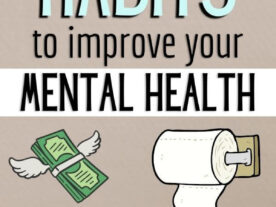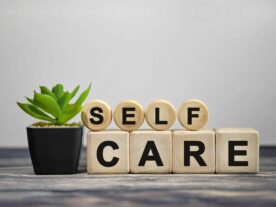7 Tips to Improve Your Financial and Mental Health
There is a connection between your mental health and your financial health. Financial problems lead to stress and anxiety. Stress and anxiety make it more difficult to manage money and earn money. It’s a vicious cycle.
Break the cycle with these 7 tips to help you on your path from stress and anxiety to financial freedom.
1. Stop Dwelling on What You Don’t Have
Are your financial woes due to overspending or debt? This might be an effect of discontent.
If you dwell on what you don’t have, you buy things you don’t need. You may like to buy small “on-sale” items because they make you feel “happy,” or you rmay try to keep up with the Joneses.
We use overspending to numb our discontent. But the discontent continues to fester and your bank account suffers.
Notice when your mind becomes consumed with wanting more. Remind yourself that more leads to clutter and financial struggle. Then give your mind some space to calm down. The discontent will pass.
2. Focus on What You Can Control
Do you lose sleep over the economy or layoffs in the news? These things are stressful, but you have little to no control over them.
Instead of worrying about things out of your control, focus on those things in which you can influence.
While you cannot make the economy yield to your desires, you can take back control of your bank account. You get to decide if you will save for a rainy day instead of spending mindlessly.
While you cannot control layoffs, you can look for other jobs, work a side hustle, or gain additional skills for an alternative career path.
3. Face Your Debt
Debt can be stressful—especially if you bury your head in the sand and refuse to face it. Ignoring those loan payments and credit card statements will not make your debt disappear.
When you disregard your financial obligations, debt piles up higher and higher because of late payments and more interest charges.
If you find yourself in this predicament, don’t worry. Here are some actionable steps you can take now: Write out all the debt you owe. Be with it. Don’t let it scare you. But at the same time, take responsibility for it.
Then, make a plan to pay it down using the debt snowball approach. Figure out how much you can pay each month. Pay off your smallest debt first, then use the money you were paying on it to pay off the next smallest debt. Keep going until you pay off all debts.
Facing it head on will do more good for your mental health that you realize. You got this.
Lower Your Debt Interest Rate with a Credit Land Balance Transfer Card
You don’t have to keep paying ridiculously high interest rates. Balance Transfer Credit Cards take all of your credit card debt, and put it onto one card. Why would you do this? Because balance transfer credit cards offer lower interest rates, sometimes down to 0% APR for 12-18 months (your rates will depend on your credit score). Can you imagine 0% interest for an entire year? What an opportunity to get ahead!
Visit Credit Land Balance Transfer to see which credit card is perfect for you. I.e. the card offering the lowest interest rate ;).
4. Improve Your Money Management Skills
Having no money in the bank is stressful, and it makes you feel like you don’t make enough (which might not even be true).
This is important: It is easy to overspend when you don’t pay attention. You could have a spending issue. Not an income issue.
Manage your money, and you will give your mind plenty of space to relax and heal.
What’s more, having an emergency fund will give you peace of mind. You will grow your emergency fund when you improve your money management skills.
Download a budgeting app and start tracking your spending.
Empower Makes Budgeting Easy
There’s a reason the Empower app is called “budgeting for people who hate budgeting!” — it makes budgeting easy for everyone, including those who dread it.
Empower includes budget suggestions, as well as fully customizable budgeting options and categories, such as major expenses, coffee, fashion, rideshare, and beauty. Best of all — Empower lets you set up spending limits in each category and will send you alerts when you’re close to going over budget.
Download the Empower app and customize your budget today.
5. Practice Good Money Habits
Good habits create a positive feedback loop. When you develop any good habit, it feels good. In turn, it makes you want to pick up another good habit, then another and another.
For example, when you make it a habit to drink water every day, you will feel healthier and want to do something else good for yourself.
When it comes to money, make it a habit to track expenses. Once you see what you are paying out, it will provide the motivation to cut back so you can save a percentage of every paycheck.
These good habits will build off one another, and they will lead to greater satisfaction with yourself.
Free Workshop – Join our free Simplify Money Workshop
The *only* way to save money is to spend less than you earn. That means you need to decrease your expenses or increase your income.
We want to help you do both.
Join our FREE Simplify Money Workshop to learn the fundamentals of growing wealth. Because when you can spend less than you earn, your money has no choice but to grow. You will build your savings and pay down debt.
What’s more? We’ve got a bunch of free money-hacks to share with you:
- Hacks to lower your monthly bills
- Hacks to spend less on debt
- Hacks to start investing
- Hacks to increase your income by $20/month (with no extra effort)
This workshop has everything you need to accomplish the cardinal rule of personal finance: keep your income over your expenses.
Join our free 5-day Simplify Money Workshop, and start growing your wealth today.
6. Check Your Emotional Spending
If retail therapy causes you mental health distress, it’s time to rein it in.
Take note of when you have the urge to shop to get an emotional boost. Get a pocket notepad and jot down what you are feeling.
Are you depressed? Write it down. Are you experiencing FOMO? Did you have a bad day at work? Put it all to paper.
If the reasons that drive your need for retail therapy signify a mental health concern, find a healthier way to deal with it, such as meditation.
7. Mind Your Thoughts
Do you find yourself feeling irritated about what you don’t have? Does the mental complaining get incessant and loud? These thoughts can hurt your mental health severely.
Notice the mental dialog. What can you do to stop the mental dialog?
A great technique is to feel yourself breathing. When you notice your mind having an irritated thought, come back to feeling your body breathe. Breathe deeply to better feel the movement.
When you are ready, move on with your day, and cut off the mental dialog as soon as you can. If you let the thoughts pass naturally, the thought becomes weaker. You do not need to numb thoughts with overspending on random cheap stuff.
Improve Your Mental and Financial Health
If you want to get your mind right, get your money right. And vice versa.
- Start budgeting
- Practice meditation to practice dropping unproductive thoughts
- Keep a gratitude journal.
- Find abundance in what you have now
UP NEXT: 5 Simple Ways to Practice Gratitude

SAVE MORE MONEY! READ THESE NEXT…
WANT MORE LIFE HACKS? CHECK THESE OUT…
Want to save these tips for later? Click here to pin this post!
Be sure to follow us on Pinterest for more money-saving life hacks!









